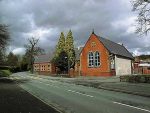 A BRIEF HISTORY
A BRIEF HISTORY
Ostensibly founded in 1575 (though the earliest recorded mention is 1618) the school’s first head teacher was one Doctor Lloyd, Vicar of Ruabon. Ruabon Grammar school was then referred to as an Endowed Grammar school as it relied on substantial endowments to educate a select number of boys of the Ruabon parish. The endowments would have been made by the local well-off and philanthropically minded. The School was housed in a building in the Churchyard which still survives to this day.
The Original School Building
The school continued – with a number of day traveller and dormer students – with curricular education provided by vicars and religious men of the parish. The first mention of a dedicated schoolmaster comes in 1710, one Mr Thomas Evans. Subsequent men to lead the school were all very well educated, graduating from Oxford or Cambridge, but still devoted to providing education within a religious context. Endowments to the school began to decline in this period but a determined schoolmaster, Mr George Bagley, fought hard to uphold the school’s reputation – even going so far as to build new kitchen facilities and sleeping accommodation funded out of his own pocket.
The School’s failing reputation and underfunding soon saw Bagley replaced with Alfred Lee Taylor, a Cambridge graduate and ordained priest. Seeing the current school as unfit for purpose with cramped conditions and unhealthy damp problems, Taylor begged for a new school building to be constructed. A deal was struck with Sir Watkin Williams Wynn, who donated the land and provided money for the building of a new school, the building being completed in 1858 (which is now the preserved frontage of ‘lower’ school – the old boys’ school). The school now became a thriving hub attracting students from outside the parish of Ruabon. Under new arrangements that saw the end of endowment schools, Ruabon became the first ‘County School’ in Wales in 1894 and from then on would receive money directly from Denbighshire County.
Ruabon County Boys’ Grammar School. ‘Absque Labore Nihil’
Although technically a County school the school was still referred to as a Grammar School. Remaining under the headship of Alfred Lee Taylor, the school became renowned for its strong traditional values. Later – under the headship of Mr JR Roberts – the school’s numbers swelled to almost 100 and demand for an extension grew. The outbreak of the First World War put these ambitions on hold as the school instead had to mourn the loss of old boys with ten former pupils dying in France. A monument to these was erected in the main hall of the school.
After armistice there was a re-emergence of the demand for an extension and yet again a new Headmaster was at the helm of the ship, one Reverend DJ Bowen. The idea of a Girls’ school was also mooted and during the extension works a separate Girls’ school was founded. Major remodelling and extensions to the school were completed in 1927 and later in 1938 with new classrooms, workshops and laboratories added and arranged around a large quadrangle. The new quadrangle featured a sun dial with the motto: “Tempus Fugit”
The School never lost its strong sense of moral and religious sentiment with prayers held before lunch in the hall every day, given in Latin, English, French and Welsh. Assemblies were held every morning and on Tuesdays and Thursdays held in Welsh. The School also had a strong sense of its own history, and everyone who entered the front door was confronted with a large terracotta shield emblazoned with the school’s motto: “Absque Labore Nihil – Nothing without Labour”. That shield is now in Ysgol Rhiwabon’s upper school’s library corridor.
The School was divided into four competing houses – Cynwrig, Madoc, Rhuddallt and Wynnstay – with fierce rivalries between them. The Grammar school went on to take boys until September 1966.
Under the new head teacher Eifion Ellis, who was appointed in 1965, the school began its transformation from the two grammar schools to an integrated comprehensive school on the same sites, the boys of 66/67 being the last to enter as 10 and 11-year-olds. The 11-plus entrance examination was abolished in Denbighshire at the same time.